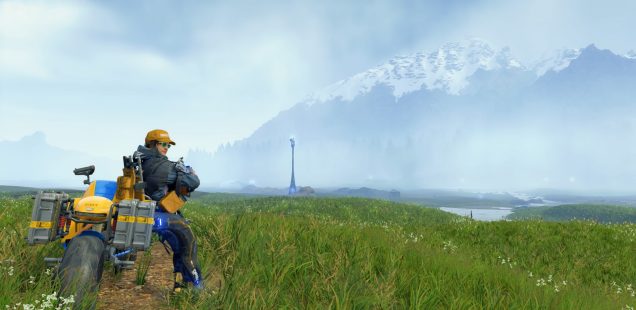
Neither Snow, Rain, nor Gloom of Ghosts: Death Stranding and the Weight of Work
Wyeth Leslie is out for delivery.
It’s been miles since the last shelter and the route has done Sam Porter Bridges no favors. Rocks clutter the delivery path and he’s already tripped once, causing several hundred pounds of cargo to spill to the ground. Frustrated with himself for the careless footstep, Sam gathers them back up, muttering expletives under his breath as each package flashes a red warning light to indicate damaged contents. Their recipients won’t be happy about it and any further spills might ruin them outright. Clouds and thunder ahead inform Sam that he has a decision to make. The quickest route is through the storm—through the corrosive Timefall rain and the ghostly Beached Things. The longer route would take Sam out of the rain but through a camp of bandit MULES. Sam eases himself down onto the ground, stopping to ponder his options. This delivery run is not on a deadline, which is fortunate since rushing into either route would only result in disaster. As he works the knots forming in his legs, the wind blows gently and BB sighs contentedly from the pod strapped to Sam’s chest.
For six summers through high school and into the start of college, I mowed lawns. Not in a “mowing the neighbor’s lawn for a couple bucks” way but in a “up to 13 hours a day in 100-degree Oklahoma heat” way. I could lose up to twenty pounds each summer and often my first act at the end of the day was to lie down in the doorway just to catch my breath before showering. By the end of each season, you could hear my knees creak from across the living room as I walked. “Hard work” does not begin to describe it. But even with the aches and sunburns, it still came with a sense of pride. As long as the day might have seemed, time blurring the lawns into an optical illusion that distorted and expanded the longer I stared, at some point it would end and I could look back and see the work that I had accomplished. It’s been a long time since I last mowed a lawn. I’ve worked other blue-collar jobs, but nothing as intensive. So it was something of a surprise that the closest I’ve come to recapturing the feeling of that summer job was Hideo Kojima’s 2019 game, Death Stranding.
The cliché “It’s about the journey, not the destination,” paints in broad strokes the work of Sam Porter Bridges as he heads west across a broken America. Sam is a laborer, working as a part-mailman part-infrastructure repair specialist for the United States government. The bulk of the game involves carrying precious cargo across grassy fields, steep ravines, and wide rivers. The drudgery is what keeps it grounded. It’s familiar work in the face of the unexplainable, as the barrier between the waking world and the afterlife dissolves. There’s a sense of comfort knowing that even as the laws of reality bend, you still need to deliver board games to The Collector in the canyon. This is a game where not only are blue-collar workers treated as heroes, but the basic mechanics and environments are designed to encourage players to care about such laborers and what they go through in order to keep society going.
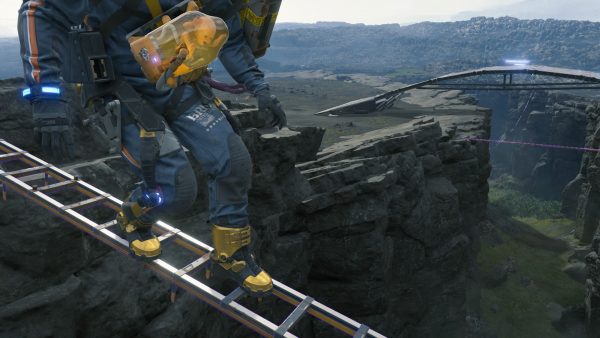
One way that the game leans into its “labor as gameplay” focus is through the controls. Purposefully disempowering, they’re not so much unwieldy as they are embarrassingly human. Often the main goal is to navigate Sam through treacherous terrain, as the aforementioned apocalypse has reshaped regions like the Midwest into something closer to the wilds of Iceland. In these spaces, Sam’s movement feels natural: as in real life, canyons, muddy fields, and mountains are hard enough to traverse even without an Amazon truck amount of cargo strapped to your back. When Sam slips and spills cargo everywhere—spitting out an angry “God damn it!” as he goes down—it’s all the more impactful because I’ve been there. I can’t tell you the number of times I rolled an ankle in a hole obscured by tall grass, or slipped on dog excrement because the owners never cleaned up after their pets. But the terrain isn’t the enemy, it is a neutral entity in Sam’s life. The mountain is not out to get him. The first climb will be difficult, but with repetition arises an ease of familiarity. I’ve come to find a lot of comfort in repetition, like quilting familiar patterns or practicing musical scales. As with mowing, this is a game about finding those familiar motions, carving routes into the landscape, gradually smoothing delivery paths with each use.
Part of the satisfaction of mowing a yard is not only being able to look back and be proud of the work that was put into it, but also from the knowledge that it benefited someone else. While mowing, it was always the more vulnerable (single mothers, the elderly, etc.) who were the most grateful. In-game, everyone is grateful for deliveries, as this is a world where a quick trip down to the grocery store is no longer a reality. Thematically, Death Stranding is all about connections, about helping one another. All the actions that you can take benefit someone else, be it an NPC or another actual player thanks to the game’s unique multiplayer component.
Sam breathes a sigh of relief as the ground flattens out. It had been hard going along the longer route. He had accidentally tripped a perimeter alarm, forcing him to hide among the tall grass as the MULES hunted for him. In that moment, Sam regretted taking on so much cargo, stacked so high on his back that it almost gave him away before he could rearrange it. That was miles ago and he can breathe easy now as the path gently winds alongside a quiet river. The sun is out and reflects off something in the middle of the water. Some unfortunate porter has lost a package and Sam will never know what misfortune befell them. He still has a long way to go and any more cargo will only slow him down, but if he delays any longer, the package will float out of range. With an annoyed grunt, he quickly sets his cargo down upon the riverbank and wades chest deep into the river, BB wailing in alarm as the water rises above the pod. Seconds before it’s out of reach, Sam grabs hold of the package and pulls it ashore. Back on solid ground, he checks the delivery order. It’s from a porter with the callsign “xXheadshot420Xx,” and is bound for a prepper bunker high in the mountains. It’s in the opposite direction from where Sam is headed but he can at least turn it in at his original destination. Some other porter headed in the right direction can take it with them and then this package’s story will be over. He tosses it on top of his current order and sets off, his steps slightly heavier. He knows he’s going to sleep well that night.
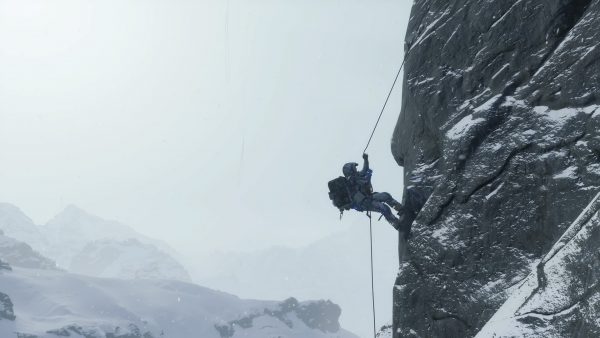
I am that person who is afraid to let the door close behind me on someone, even if they’re not particularly close, and as such, any time I come across a lost package from another player, I try to grab it. Even if I’m already overburdened, a post box is thankfully never that far off course. There are more labor-intensive methods of caring for others, such as devoting time and resources to building a safe house in a remote mountain location. But more often, the act of caring for others is smaller and you have no way of knowing how the other person is impacted. Knowing others are laboring just as you are can make all the difference in how you work and view other workers. It certainly has for me. I’ve met some good people while working manual labor jobs, not always the kind of folks I would want to hang out with over the weekend, but together in the middle of a job there’s a sense of comradery that makes the job all the more bearable.
Working outside in the elements can be difficult even in the best of times. My time spent mowing was marked mostly by heat but occasionally a summer storm would break the routine. Since it is ill advised to be pushing a chunk of metal around while lightning closes in, the whole crew would round up and cram into the truck to try and wait out the storm, the windows fogging from our sweat and the summer humidity. These were special moments of shared experience as we were all witness to something larger than ourselves. Mostly though, the solidarity came from sharing the same work. We had inside jokes about our jobs that mutual friends wouldn’t get, and understood each other’s complaints about the really hard yards. This sense of community extended to other mowing companies. Whenever my crew would pass others, we would always nod and wave or if possible, make small talk about how each other’s daily lineup of lawns was going. Full time mowing is a tough and dirty job, just like hauling boxes of cargo across apocalyptic expanses would be, but these kinds of connections can make it more bearable.
Death Stranding understands that workers should not go unsupported, whether it’s by others or some form of compensation. While it’s not clear if there’s a true currency in this depicted future, Sam is still well-supported in his work. If the crafting resources are available, any tools needed are free for use and he’s given all the lodging and energy drink refills needed to keep going. He’s treated like a rock star folk hero, his legend spreading: the delivery man who lets nothing stop him from completing his deliveries. People can’t stop thanking him as they grow to trust him with their packages, and they show their gratitude with the occasional bit of supplies or technology upgrade, similar to how some people leave Gatorade on the back porch for their mowers. It’s a sense of respect that unfortunately not everyone is capable of. I can still remember the looks some people would give my mowing crew in gas stations or fast-food restaurants. It couldn’t be helped that we were dirty, our sweat gluing dirt and grass to our bodies. Such experiences made the sympathies of other workers and “Gatorade houses” all the more precious.
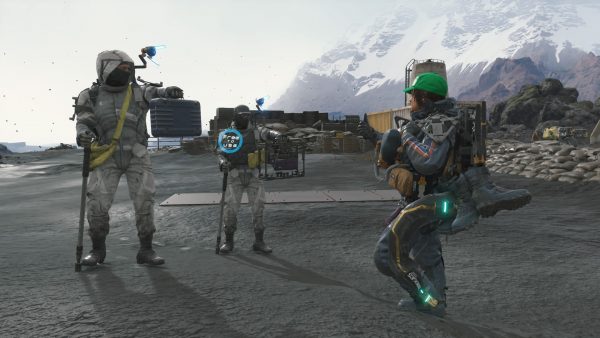
Even though Sam knows the final miles to a destination are always the longest, he can’t help but smile as the regional distribution center is finally visible on the horizon. As he enters the homestretch, Sam’s cufflinks alert him to a surprise rainstorm that is fast approaching. Swearing under his breath at the last-minute complication, he pulls up a map and locates the nearest Timefall Shelter, an umbrella-like structure where he can wait out the rain. One is nearby and already populated. As Sam approaches, the first drops of rain falling and sizzling on his unprotected cargo, he spies a pair of freelance porters already taking refuge beneath the shelter’s overhang. They wave as he approaches, and Sam returns the gesture. They greet him as he gets within earshot, asking how he’s been. As the storm intensifies around them, Sam and the porters swap stories and complaints about the nature of their job. The shower is quick to pass and it’s no more than an hour before the sun begins to reappear. As both parties begin to gear up again, the freelancers offer Sam some of their equipment. Sam is government contracted, given the most cutting-edge tools of the trade which are far beyond what he’s being offered, but he’s still touched by the gesture. He politely declines and instead gives them a few of his own tools, having just gone through the route they are about to take. Besides, he’s almost done for the day and can restock before the next trip out. With the storm fully dissipated, the group splits, thumbs-upping one another a few “Likes” before they go, and a tired Sam crosses the final miles to his home for the night.
If you care even a little about a job, it sticks with you. A decade on, I can still remember moments where I should have worked harder on a lawn. I also recall where I was standing when my boss took a moment to give me an unexpected compliment. These are the highs and lows of day in, day out work, just as Sam slowly but surely makes his way West. Some days he is in the mud, struggling to make it across the map. Other days, the sun is shining and the path is straight and clear. In the grand scheme of things, mowing lawns probably does very little to help stave off the collapse of civilization. Sam, though, is an essential worker in the truest sense of the phrase, keeping the lights on one delivery at a time. He knows what’s at stake, so does his government, and they spare no expense to ensure that he has all that he needs for his work. Being a porter is largely an insular job that leaves you alone with your thoughts. While Sam’s life is hard enough with specters, bandits, and terrorists, he is at least spared petty customers. He does receive the odd pushy email, but his paths take him out in the wild untamed spaces without people. As you guide him along, every now and then you’ll hear Sam quietly mutter, “Always liked the quiet,” a phrase I find relatable, as I’ll never lose the sensation of what it’s like to finally turn off a noisy lawn mower and stand for a moment in the silence. When Sam collapses onto a bed, I feel it because I’ve been there. There were days so hot that it felt like the inside of my lungs were burning but I still showed up the next day, same as anyone else who needs to make ends meet. So much of the game’s energy is spent on worker solidarity, encouraging players to understand the exhaustion and toll that day-in day-out labor can cause, and it’s heartening to see it in a game of Death Stranding’s size and profile. Sam may be a God among deliverymen, but he is not above burnout.
Death Stranding is also a weird game filled with vivid and surreal imagery. Just look at your most loyal coworker, a baby in a pod. Still, it never loses sight of itself as a slow experience about work that genuinely feels like work. Almost the entirety of the core game is spent toiling in isolation and it can be hours before a plot point appears, making it all the more jarring when something happens like a supernatural Mads Mikkleson dragging you down into the trenches of World War I. The combination of elements is like salt perfectly balancing out the sweetness of a dish, each enhancing the other. Perhaps the empty spaces between destinations are meant as time for Sam to ponder all that he has found himself wrapped up in. I like to imagine that after each stressful development, a delivery hike does him good. It’s almost no different from my best days of mowing when it was just me, my headphones, and a lawnmower on a large stretch of land. As an unfortunately angsty teenager, mowing gave me a place where I was able to learn how to be alone. Eventually, I’d finish the job and would be able to look back at what I’d accomplished. Death Stranding recognizes that if it is to focus on labor, then it needs to convey the weight of work, both physically and emotionally. Sam’s journey is long and arduous but crucial to humanity’s survival. Very few people can claim this in real life but the game doesn’t just treat Sam with respect, it treats anyone working with a sense of reverence, regardless of whether they are directly dealing with the apocalypse or a simple delivery of soil samples.
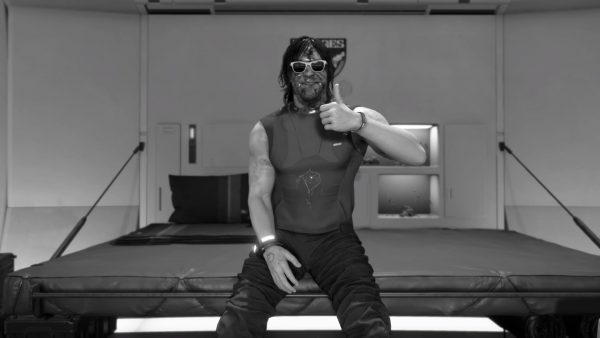
Strewn out ahead of Sam, there’s a smattering of footprints. The local freelance porters have been busy. The once rocky terrain is now smoothed down to well established trails. Sam was the vanguard, the trailblazer, the first porter to enter the territory and now the whole area is buzzing as America slowly comes back together. It’s no small irony that the formerly empty space of land is now littered with digital signs that say, “Don’t litter.” But bridges and roads have sprung up too, and for that Sam is eternally grateful. Delivery routes that used to take days now take hours and the new zipline system crisscrossing the Rocky Mountains means he will never again almost freeze to death high above the treeline. With no new orders at the moment, it’s time for a day off. His favorite motorcycle has been in storage for too long and a trip through the foothills of the Rocky Mountains will be a well-deserved break from all the recent walking. The motor roars to life and Sam is gone, a blur headed west.
An MFA graduate from Oklahoma State University, Wyeth Leslie is a poet and author interested in the intersection between technology, the environment, and human relationships. His writings have been featured in publications such as The Vital Sparks, Lost Futures, The Daily Drunk, and Haywire Magazine. He can be found staring into the abyss on Twitter.